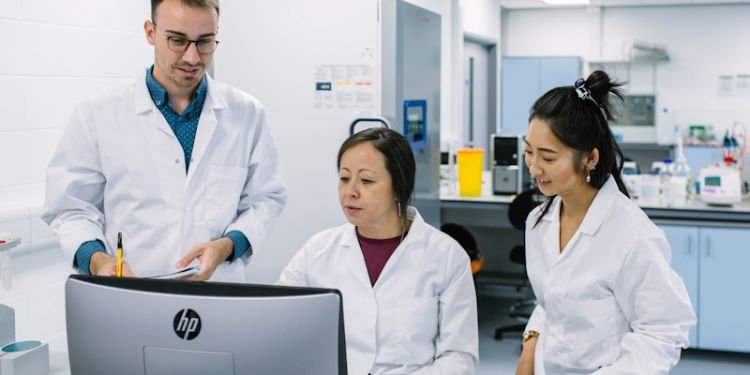Simulation and theoretical modelling of food systems

Our modelling research covers theoretical and simulation methods spanning a uniquely broad and diverse range of topics within food science. Our expertise encompasses almost every aspect of food systems, including:
- Atomistic behaviour of food molecules;
- Mesoscopic and colloidal length scale structures;
- Macroscopic simulations and mathematical analysis of food process operations;
- Modelling the global large scale impact of food on sustainability, the spread of disease, and health and the environment.
Identifying greener solutions
Modelling provides novel ideas and new avenues, highlighting potential research directions for future practice-based projects, and possibilities for optimising current ongoing work.
Current theoretical studies in the team attempt to identify novel ways of combining naturally occurring amphiphilic macromolecules to design superior, plant based edible emulsifiers. These are to provide alternative, greener replacements for the largely animal based proteins currently used in industry.
Achieving this not only requires expertise in modelling of colloid and interfacial phenomenon, but also in mathematical analysis of consumer preferences and acceptability, as well as in theoretical predictions of future impact of food resources and sustainability.
Some examples of projects which illustrate the breadth of our research activity are as follows:
-
The structure of environmental minerals and their interactions with chemicals and pharmaceuticals; the structure and chemistry of biomaterials, e.g. bone graft materials;
-
Nutritional supplements and drug delivery particles - the impacts of trace elements, e.g. Si, on the structure of biological tissues and, the interactions of bacterial biofilms with antimicrobial drug molecules and biological/implant surfaces;
-
Behaviour of biopolymers at hydrophobic-hydrophilic interfaces with the aim of designing superior novel plant based emulsifiers/steric colloid stabilisers;
-
Modelling the formation and stability of emulsions and bubbles;
-
Theoretical studies of the Impact of the mesoscopic structure on the transport properties (e.g. flavour release, diffusion, thermal conductivity) in food systems;
-
The use of partial and ordinary differential equations to model ultrasonic spectroscopy and visco-inertial acoustic scattering in emulsion systems;
-
Utilise dietary data to conduct exposure assessments and spatial distribution of contaminants e.g. heavy metals in aquatic systems and aflatoxin;
-
Computational medicinal chemistry and biochemistry in drug design and drug target discovery using structural bioinformatics;
-
Biostatistical approaches for molecular epidemiology related to biochemical pathway elucidation;
-
Statistical analysis of large data sets with the aim of detecting patterns in a population (which may be nutritional, genomic, or metabolite) to highlight possible relations to health outcomes (e.g., diabetes, cancer, obesity, etc.).
Industrial collaborations
The group has had many industrial collaborations, either as standalone pieces of work, or those that involve theoretical modelling as part of a larger research project. These collaboration are not all confined to food based industries, but occasionally to other companies too where our expertise is seen as an asset. Examples of industrial partners with whom we have collaborated in recent years include:
- Akzonobel
- Golden Fries
- Mars
- Henkel
- FERA
- Fujifilm
Interdisciplinary research
There is an interdisciplinary culture at the University, exemplified by the collaborative working of our researchers. Modelling can clarify and rationalise understanding of the results generated by our researchers within different food science groups who are collaborating.
Further information
View all members of our research group, research projects and publications.
PhD projects
We have opportunities for prospective postgraduate researchers. Find out more.
Contact us
If you would like to discuss an area of research in more detail please contact a relevant member of staff.

